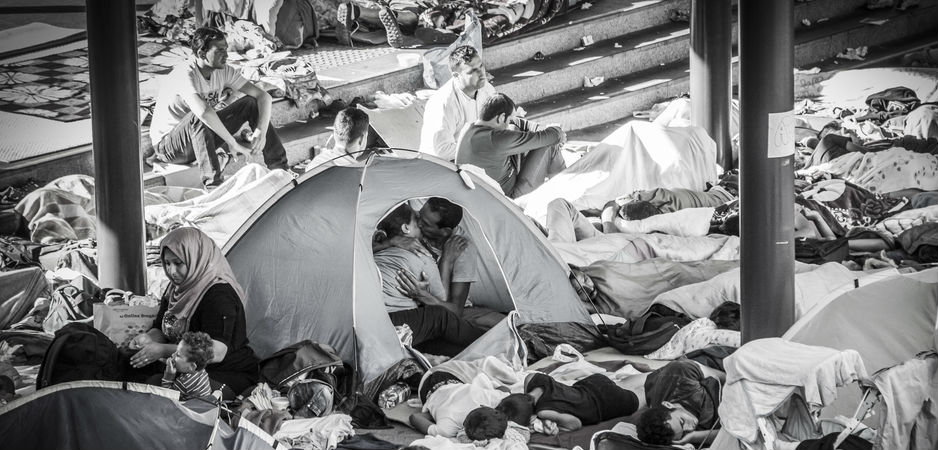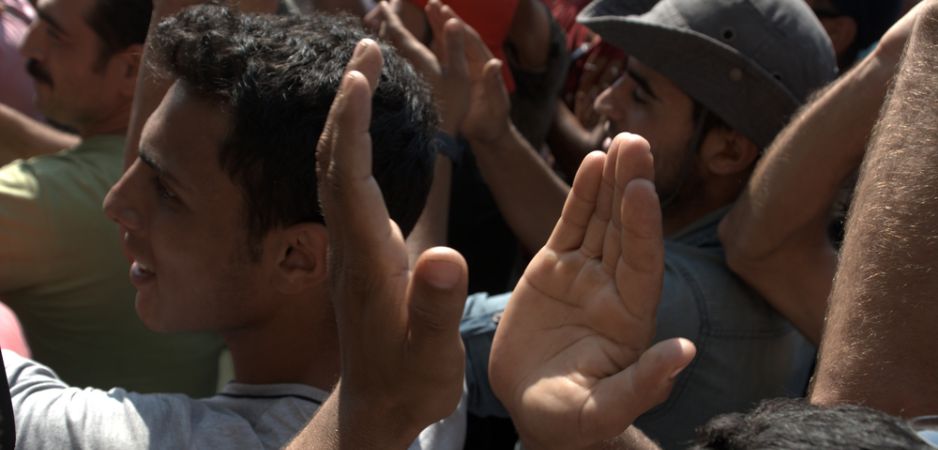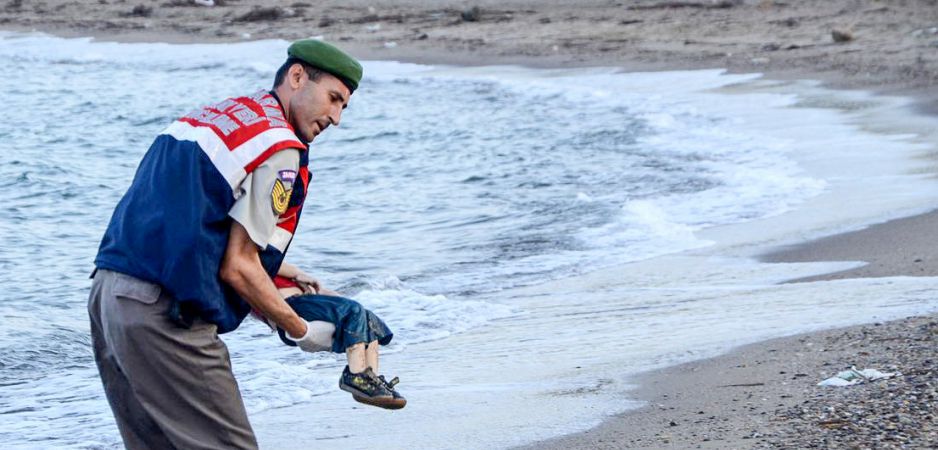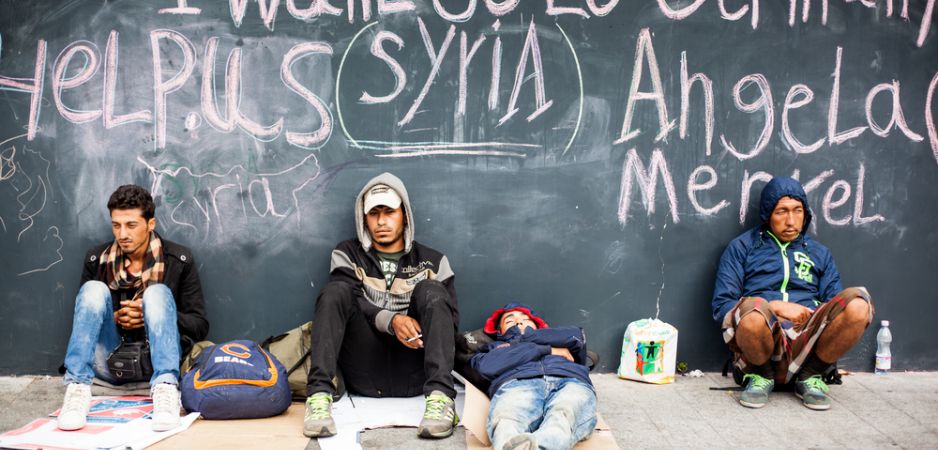Europe’s new border policy that bars entry of economic migrants is unfair for those seeking a better life. It is not a solution for resolving the “migrant crisis.”
When Chris Roberts and his teenage daughter Josie volunteered to spend their holiday break in Greece to help Syrian refugees with the small local nonprofit Mazi Brosta, they did not realize what they were getting themselves into. Just two days before the Roberts arrived in the border-town of Indomeni, Macedonian authorities announced it would only be permitting Syrian, Iraqi and Afghan refugees to enter the country.
Crossing into Macedonia was critical for the refugees and migrants, many of whom sought to ultimately settle in Germany, Hungary, Austria or the Scandinavian countries.
However, it is not only refugees leaving war-torn countries who are looking for a better life. Migrants hailing from states with oppressive regimes and little economic prospects also seek to improve their lives by moving to Europe. But that may no longer be an option for them. “Economic migrants,” an umbrella term used to describe virtually all other migrants whose lives were not in imminent danger, would be barred entry into Macedonia and many other European states.
The decision sparked outrage among the economic migrants, who like the Syrians had made the harrowing journey to Greece. While the Roberts were told they would be assisting in food distribution and helping Syrians walk across the border, they also wound up spending much of their time with these economic migrants who were left behind in the overpopulated and undersupplied camps. The camps have since been cleared by the Greek government. However, the Roberts’ experience and the plight of the economic migrants illustrate the grim reality of Europe’s migrant crisis and, most importantly, the region’s sluggish initiative to resolve it.
The new border policies have since been enforced throughout the Schengen Zone, where 26 European states previously held no border control before the recent influx of migrants. By the end of 2015, the International Organization for Migration (IOM) reported that over 1 million migrants had entered Europe, with 800,000 of those passing through Greece alone. In order to curb the number of migrants entering the continent, and their resettlement, the European Union (EU) has resorted to enacting discriminatory border policies against them. While most asylum claims of the new economic migrants have been rejected, Europe also seeks to expedite the process of deporting them back to their home country.
Both Austria and Germany have pledged to take tougher actions against economic migrants, who have recently been vilified as being opportunistic for taking advantage of the Syrian refugee crisis. One scanty news report in a British tabloid claims that some of these migrants have faked being Syrian in order to claim EU asylum, as evidenced by Turkey’s growing black passport market. However, most of those who qualify as economic migrants are not even Arab, and would likely be unable to get away with faking an entirely different ethnic identity, let alone a language.
A Lot of Widows
Indeed, the economic migrants have legitimate claims for asylum. Most hail from West and Sub-Saharan Africa, South Asia and the Balkans. When asked if these migrants were taking advantage of Syrian refugees, Chris Roberts is quick to dismiss the accusation.
Roberts, a senior executive at Rentrak, a global media measurement and research corporation, has spent many of his vacations volunteering abroad, including in the Democratic Republic of Congo (DRC) where he serves on the Board of Directors for Our Family in Africa, a nonprofit dedicated to helping orphans. Like those he helped in the DRC, he recognizes the need to understand the marginalized and ultimately forgotten.
First, he points out that migrants have been following this path from Greece into Macedonia for decades, long before the Syrian refugee crisis. Second, he describes the people who helped during his time at Indomeni: “99.99% of the people were the most gracious, humble, kind and beautiful people I have met.”
He grimly reminisces about seeing migrants with no legs, in wheelchairs, children with mental disabilities and widows. “A lot of widows,” he says.
One image that has fixed itself in his memory is that of an Iranian woman with seven kids and their feeble grandmother, trying to cross the border into Macedonia from Iran, only to be turned away.
It is not just “bad men” like the news tends to paint of these economic migrants who are trying to enter Europe. While their lives back home may not have been in any imminent danger like those in Syria, Iraq and Afghanistan, they still suffered at the hands of corrupt governments and poor economic prospects. Their lives were dreadful enough to force them to leave everything behind in a familiar place they called home to a foreign country where their futures were at best uncertain. It was a gamble they were willing to take. They just did not realize how egregious the new border policies would stonewall their plans for a better life.
After being turned away by Macedonian authorities, and feeling hopeless, some economic migrants in the Greek border town of Indomeni protested, while others accepted their grim fate. Iranians, feeling especially hopeless knowing that they could not return to Iran, launched a hunger strike. About a dozen men sewed their lips shut to demonstrate their commitment to the protest and, more importantly, their desperation to cross the border. Photos of their dead eyes, swollen lips and blood-red letters “IRAN” drawn on their forehead went viral. The Iranians, who largely led the protests along with other economic migrants—most of whom as Roberts recalls were from Morocco, Bangladesh and Pakistan—decried the new border policies as being racist.
Obligation Under International Law
Some argue that the new policies are not only racist, but illegal. According to Article 3 of the Convention and Protocol Relating to the Status of Refugees, adopted by the United Nations General Assembly in 1951, states are obligated to assist refugees “without discrimination to race, religion or country of origin.”
There are many nuances between the term “refugee” and “economic migrant,” the latter connoting voluntary immigration instead of displacement or fleeing persecution and danger like the former. Iranians are frustrated by the new border policies because they not only fled Iran for lack of economic opportunities, but also freedom. Many of them are Christians struggling to live in the Islamic Republic and are often treated as second-class citizens. It can be argued that these Iranians, or “economic migrants,” actually qualify as refugees.
It is not just Iranians, however. Many of the economic migrants who made it to Greece suffer from the lack of economic opportunities in their home countries because they are religious or ethnic minorities. Despite these realities, those who are not Syrian, Iraqi or Afghan are brushed under the umbrella term “economic migrants,” and their claims for asylum—many legitimate—are ignored.
Recipient countries are not obligated to provide asylum for economic migrants. However, they are required to review every asylum claim. Under the new discriminatory border policies, they have not been. It is not only imperative for these states to fulfill their commitments under international law, but also avoid setting a precedence that can lead to long-term, irreversible consequences.
Not the Answer
Europe must incorporate a solution that addresses economic migrants as part of its comprehensive plan for the refugee crisis, instead of ignoring it. By failing to do so, states may continue to indefinitely discriminate against economic migrants based on nationality long after the end of the Syrian Civil War. Syrians and those who face imminent danger in their home countries should continue to be prioritized. However, economic migrants need to be recognized as well, considering that many of them have legitimate asylum claims.
A discriminatory blanket border policy that shuts the doors to Europe is not the answer.
Despite bearing witness to the immediate aftermath of the new border policies, Chris Roberts does not posit blame on European authorities. While news reports may focus largely on the extremes—like the mass sexual assaults that took place in Cologne, Germany allegedly by refugees, and the video of Macedonian police attacking Syrian refugees with batons that went viral—he is humbled by what he did see: Greek musicians playing violin for those stuck at the camps; locals who would donate baskets of goods for him to take to the migrants; and his fellow volunteers who paid out of pocket for much-needed supplies. In his conversations with Macedonian border control, it was apparent that they shared his frustration, but were just “following orders” from the EU.
“When I went over [to Greece], I thought I would just be helping Syrians,” he says. “I wound up helping 20 countries.”
It is easy to overlook the plight of economic migrants like those who Roberts not only helped, but got to know. He believes that Europe’s new border policies are not the result of malicious intent or a reflection of a racist attitude toward foreigners, but rather a lack of understanding.
“When you are on the frontline, you come back with the truth.”
Both he and his daughter Josie hope that this truth, the reality that both refugees and migrants face alike, will encourage more European states and other countries to open their borders and welcome them.
The views expressed in this article are the author’s own and do not necessarily reflect Fair Observer’s editorial policy.
Photo Credit: Chris Roberts
 We bring you perspectives from around the world. Help us to inform and educate. Your donation is tax-deductible. Join over 400 people to become a donor or you could choose to be a sponsor.
We bring you perspectives from around the world. Help us to inform and educate. Your donation is tax-deductible. Join over 400 people to become a donor or you could choose to be a sponsor.
For more than 10 years, Fair Observer has been free, fair and independent. No billionaire owns us, no advertisers control us. We are a reader-supported nonprofit. Unlike many other publications, we keep our content free for readers regardless of where they live or whether they can afford to pay. We have no paywalls and no ads.
In the post-truth era of fake news, echo chambers and filter bubbles, we publish a plurality of perspectives from around the world. Anyone can publish with us, but everyone goes through a rigorous editorial process. So, you get fact-checked, well-reasoned content instead of noise.
We publish 2,500+ voices from 90+ countries. We also conduct education and training programs
on subjects ranging from digital media and journalism to writing and critical thinking. This
doesn’t come cheap. Servers, editors, trainers and web developers cost
money.
Please consider supporting us on a regular basis as a recurring donor or a
sustaining member.
Support Fair Observer
We rely on your support for our independence, diversity and quality.
Will you support FO’s journalism?
We rely on your support for our independence, diversity and quality.




















